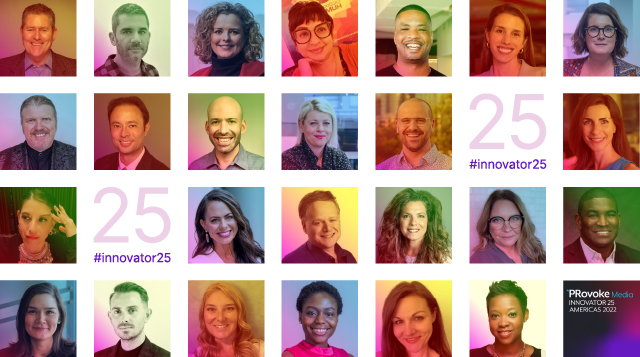
Gregory Galant
Cofounder & CEO
Muck Rack
Miami, FL
“What PR means today is completely different from what it meant ten years ago, and we need to continue to follow the tech and media evolution and try new things to remain competitive and prove PR deserves a seat at the leadership table."
Creating and evolving Muck Rack counts as Gregory Galant’s most innovative achievement to date. Originally launched as a way for journalists to find each other on social media, the platform has followed trends to become a public relations management platform enabling thousands of organisations to tell their stories through earned media and show the value of their work. Perhaps as the ultimate endorsement, companies like Google, International Rescue Committee and Golin all use the platform. Under Galant’s leadership, the platform has seen significant growth and recently took on a minority investment by thoughtfully growing and nurturing the team and enhancing its product offering.
Co-creating and executive producing the Shorty Awards, which celebrate the best of social media, must also be up there as an innovative achievement for Galant. Winners have included Lizzo, Ricky Gervais and Rebel Wilson. Given that he began his career as an entrepreneur by founding an internet business at age 14, it’s fair to say innovation is in his DNA and he launched the Venture Voice podcast in 2005 to help fellow entrepreneurs learn from the experiences of others who have built successful businesses. He’s also a member of Twitter and Instagram’s exclusive first name club, tweeting and ‘gramming at @gregory across both platforms.
How do you define innovation?
The constant movement toward new solutions and ideas. Innovation does not have to include technology, which is one of the best parts about it.
What is the most innovative PR or marketing initiative you've seen over the past 12 months?
The Coinbase advertisement for the 2022 Super Bowl. The 60-second spot was nothing but a floating QR code on national television, which resulted in a crashed website and sparked a lot of conversation around the app and topic of bitcoin. The ad itself created a PR moment, so it turned into a really brilliant culmination of paid and earned media coming together. As innovators, sometimes we can get caught up in what everyone else is doing that in turn limits our creativity. Sometimes it’s not about how big you go, but rather doing something that captures the attention of your audience while feeling true to the ethos of the brand.
In your opinion, which brands and/or agencies are most innovative in their approach to PR and marketing?
I really like what Duolingo–who are Muck Rack customers–has done. They've managed to make education and learning a new language fresh and fun and have continued to push their brand innovation even post-pandemic, which is no easy feat, given how successful they were during that time period. I read recently about a taqueria they opened near their headquarters in Pittsburgh where customers can get a discount on their food if they answer a question in Spanish correctly. Tying food to language is a brilliant way for them to engage target audiences who are looking to expand their cultural experiences in different ways.
Describe a moment in your career that you would consider to be innovative.
The founding and iteration of Muck Rack is the most innovative part of my career. My cofounder Lee Semel and I began noticing in 2009 how journalism was changing and there wasn’t a way for journalists to find each other on social media. We created Muck Rack to solve this need and it became popular immediately with journalists, with more than 10,000 requesting to be added to the site within the first year.
About two years in we noticed that while our focus was on providing a solution for journalists, PR pros were also using our platform to research reporters and build better relationships. That is when we decided to evolve our business and launch the Muck Rack software platform, offering basic journalist profiles, email alerts, search and lists for both journalist and PR pros. Since then, Muck Rack has transformed into a Public Relations Management (PRM) platform, enabling thousands of organizations to build trust, tell their stories through earned media and show the value of their work.
Who do you admire for his/her approach to innovation?
I’ve always admired Andy Grove’s leadership in pivoting Intel, after it was already a successful public company, into a totally new line business. As he described in his excellent book “Only the Paranoid Survive,” it’s easy to talk about how an organization values innovation, but extremely hard to actually get thousands of people to move forward together into an uncertain future.
How do you get out of a creativity rut?
Going for a bike ride to clear my mind and talking to customers as a way to spark new ideas on how we can build software to solve their problems.
What advice would you give to the PR industry around embracing innovation?
Don’t remain stagnant in anything. What PR means today is completely different from what it meant ten years ago, and we need to continue to follow the tech and media evolution, try new things to remain competitive and prove that PR deserves a seat at the leadership table.
What would you be doing if you weren't doing your current job?
Full time philosopher.
Which book/movie/TV show/podcast/playlist/other cultural source has provided inspiration over the past year?
I just finished rereading the biography of Benjamin Franklin by Walter Isaacson. Franklin was one of America’s first journalists and publishers (kind of like launching a Substack today, people really had to do it all back then). He was one of the first to really understand publicity in America too as he gained worldwide fame for his inventions, and worked on shaping the image of a fledgling nation.
How would you like to see work culture, and the role of the office, evolve?
I would like to see more businesses trust their employees to be productive from anywhere, and consider adopting a hybrid or fully distributed workplace. In 2022, 34% of US workers have returned to the office full-time, yet 61% of workers want to work remotely indefinitely.
As a leader in remote work since 2009, we believe that if you give employees the flexibility to get the job done from wherever they are, they’ll produce better work and they’ll be happier. People need to be in the right mindset to produce good work and this doesn’t always happen during standard business hours or in a traditional office environment. That’s why we founded The Work Remotely Forever Pledge in 2021, a commitment by business leaders who promise not to force their employees to work from an office. Since launching, more than 75 companies have signed on.
Not every employer needs to be fully distributed, but providing flexibility that is requested by employees goes a long way and allows them to have better work-life balance, which ultimately is better for the company.
How can the PR and communications industry harness innovation to make more progress on diversity, equity and inclusion?
This brings me back to my definition of innovation: the constant move toward new solutions and ideas. Journalism has worked to diversify narratives, but to make real change in the industry, PR and communication professionals need to evolve to ensure DEI is a common thread throughout everything they do. What does that mean exactly? Diversity must be table stakes instead of an add-on element in order to elevate a more diverse range of voices and provide a workplace where people can bring their true selves to work. Only then will we be able to work together to move towards new solutions and ideas that create real change.


 Podcasts
Podcasts Videos
Videos Profiles & Interviews
Profiles & Interviews Crisis Review
Crisis Review Coronavirus
Coronavirus Trend Forecasts
Trend Forecasts Social & Digital
Social & Digital Technology
Technology Consumer
Consumer Employee Engagement
Employee Engagement Sports Marketing
Sports Marketing  Global PR Agency Rankings
Global PR Agency Rankings Agencies of the Year
Agencies of the Year Innovator 25
Innovator 25 Creativity in PR
Creativity in PR Asia-Pacific Communication Index
Asia-Pacific Communication Index SABRE Awards
SABRE Awards PRovokeSummit Global
PRovokeSummit Global PRovoke Media Regional Series
PRovoke Media Regional Series Agencies of the Year
Agencies of the Year Roundtables
Roundtables Agency Playbook
Agency Playbook.jpg) All Jobs
All Jobs






